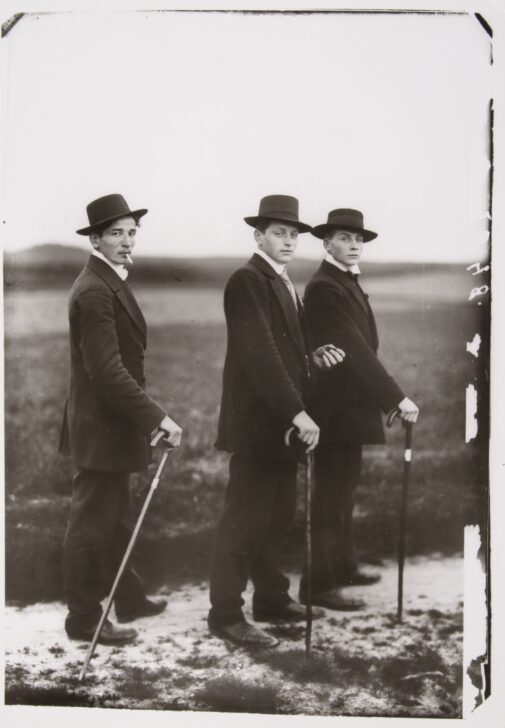Jungbauern
August Sander

Description
August Sander
Germany, 1876–1964
Jungbauern
1914, printed later
Gelatin silver print
Gift of Maxine and Lawrence K. Snider,
2012/2.104
German photographer August Sander took hundreds photographs of his fellow countrymen during the first few decades of the twentieth century. His goal was to create an extensive series of portraits that would represent all “types” of German peoples. Early in his career, Sander established a commercial portrait studio in Cologne-Lindenthal in eastern Germany. Seeking clients, he traveled the surrounding countryside, often stopping in small communities to photograph individuals from different social groups. Because Sander used the work and home environments of his subjects as backdrops for their portraits, they convey many details about their social status, personal relationships, and labor and leisure activities.
Photographed in Sander’s native Westerwald, these three dapper Jungbauern (young farmers), canes in hand, have stopped to pose for the itinerant photographer during a stroll down a rural path leading toward a dance in a nearby town. The men appear cool and confident as they turn their heads in unison toward the camera. Sander’s image of young adults embarking on an evening of merrymaking, taken the year World War I began, belies the turmoil that would confront their generation in the coming years.
Subject Matter:
This portrait appears in Sander's portfolio The Farmer, although the figures were actually miners. The young miners are dressed in suits, holding canes, and posing on a country road on their way to a dance. Their attire reflects access to mass produced clothing while their mode of transportation references on their class. Standing in single file line, the three young men all face the camera with a self-assured gaze and non-chalant pose. This photograph appears in Sander’s lifelong work Citizens of the Twentieth Century. In this series, Sander aspired to create a comprehensive anthology of Germany by photographing all aspects of society, as he believed in the portrait as a true representation of a society. The Nazis found this work in opposition to their narrow ideals. In 1934 they destroyed Sander’s plates and banned him from making portraits, however many of his negatives survived.
Physical Description:
This photographic portrait of three young men shows them dressed in suits, paused during a walk on a rural road.
Usage Rights:
If you are interested in using an image for a publication, please visit https://umma.umich.edu/request-image/ for more information and to fill out the online Image Rights and Reproductions Request Form.